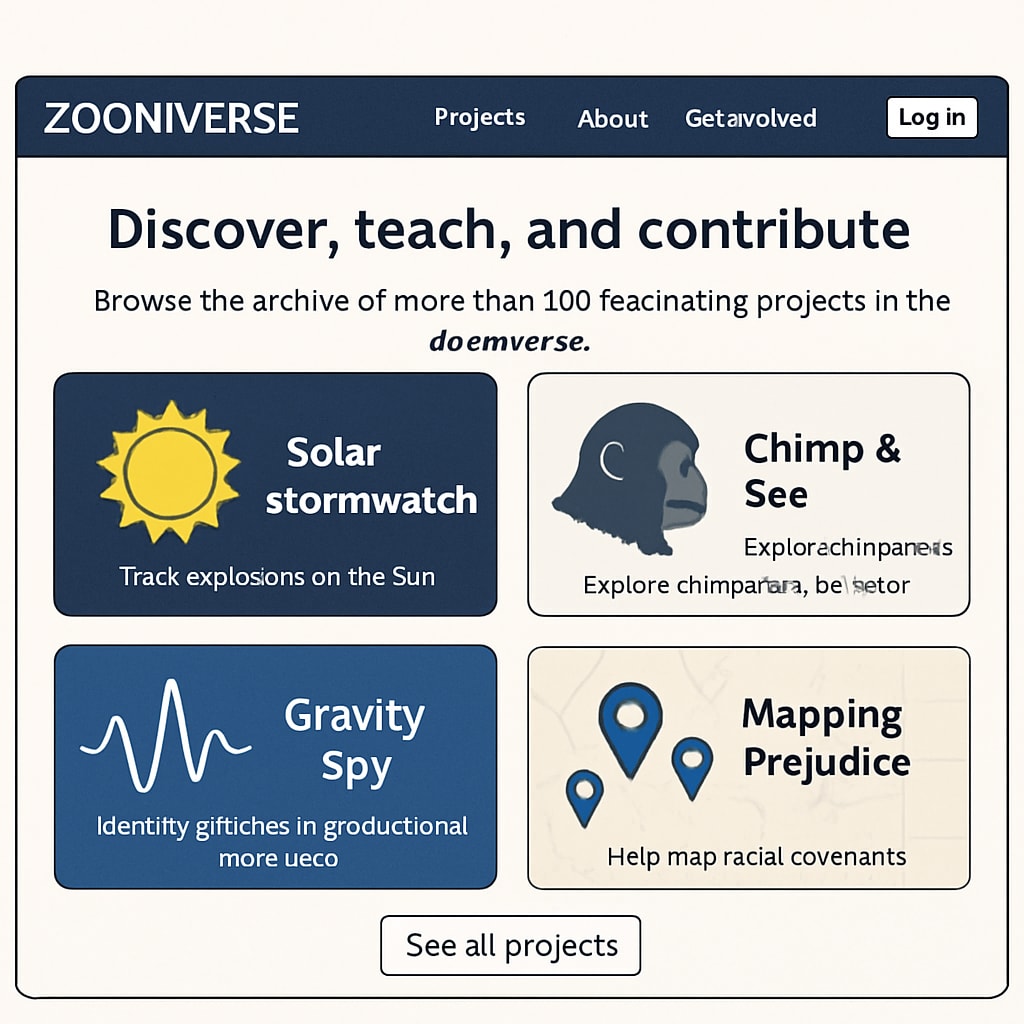Public science platforms like Zooniverse have revolutionized the way students engage with scientific projects. By allowing K12 students to participate in real-world research, Zooniverse fosters critical thinking and scientific exploration, transforming classrooms into hubs of discovery. This article explores how educators can integrate Zooniverse into their curriculum, helping students become active contributors in the scientific community.
What is Zooniverse and Why is It Important for K12 Education?
Zooniverse is the world’s largest platform for public science (also known as citizen science). It hosts a wide range of projects across disciplines such as astronomy, biology, history, and climate science. Students can contribute by classifying galaxies, identifying wildlife in camera footage, transcribing historical documents, and more. The platform bridges the gap between theoretical learning and practical application, encouraging young learners to dive into the scientific process firsthand.
For K12 education, Zooniverse offers an unparalleled opportunity to cultivate curiosity and scientific literacy. Unlike traditional methods that focus on passive learning through textbooks, Zooniverse empowers students to engage directly with authentic data and meaningful research. This hands-on approach not only makes science more accessible but also builds essential skills such as critical thinking, problem-solving, and teamwork.

Integrating Zooniverse into the Classroom: Practical Tips for Educators
Every educator aims to spark curiosity and inspire their students. Zooniverse provides a versatile tool to achieve these goals. Here are several practical ways to integrate Zooniverse into your classroom:
- Select Relevant Projects: Choose projects that align with your curriculum. For example, astronomy classes might explore galaxy classification projects, while biology lessons could focus on wildlife observation.
- Guide Students Through the Platform: Start by introducing Zooniverse during a classroom session. Show them how to navigate the interface, select projects, and record observations.
- Create Collaborative Opportunities: Encourage teamwork by assigning students to small groups, where they can discuss findings and share insights.
- Connect Projects to Real-World Applications: Explain how their contributions to Zooniverse projects help researchers solve real-world problems, making their work impactful and meaningful.
By following these steps, educators can seamlessly integrate Zooniverse into their teaching methods, fostering an environment where students are excited to learn and contribute to scientific discoveries.

Benefits of Engaging K12 Students in Public Science Projects
Participating in Zooniverse projects benefits students in several ways, both academically and personally. Here are some key advantages:
- Hands-On Learning: Students interact with real scientific data rather than theoretical examples, enhancing their understanding of scientific principles.
- Critical Thinking Development: Analyzing data requires students to evaluate evidence, identify patterns, and draw conclusions—skills crucial for academic and professional success.
- Increased Engagement: The interactive and dynamic nature of Zooniverse projects keeps students motivated compared to traditional classroom methods.
- Exposure to Diverse Disciplines: With projects spanning astronomy, history, ecology, and more, students can explore various fields and identify their areas of interest.
- Global Impact: Knowing their contributions assist real researchers gives students a sense of purpose and connection to a larger global effort.
As a result, Zooniverse serves not only as an educational tool but also as a platform for personal growth and empowerment.
How Zooniverse Prepares Students for Future Careers
In today’s rapidly evolving world, STEM skills (Science, Technology, Engineering, and Mathematics) are more important than ever. Zooniverse helps students develop these skills early by immersing them in authentic research experiences. Through project participation, students gain proficiency in data analysis, technological literacy, and collaborative problem-solving—skills highly valued across industries.
Moreover, engaging in public science projects allows students to experience the real-world application of science, potentially sparking interest in pursuing STEM careers. For example, a student fascinated by wildlife monitoring on Zooniverse might decide to study ecology or environmental science in college. By providing this foundational experience, Zooniverse prepares students for both academic and professional success.
For educators and parents, adopting Zooniverse as a teaching tool means investing in the next generation’s scientific curiosity and innovation. It’s a step towards creating a future where young learners are not just observers but active contributors to the scientific community.
Conclusion: Zooniverse is more than just a platform; it’s a gateway for students to explore science, contribute to real-world research, and develop critical skills. By integrating Zooniverse into K12 education, we can transform classrooms into spaces of discovery and empower students to become the scientists of tomorrow.


